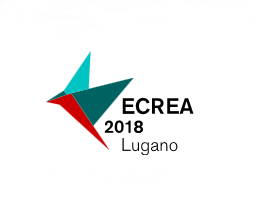 The European Communication Research and Education Association (ECREA) in partnership with USI Università della Svizzera italiana call for proposals to be presented at the 7th European Communication Conference, to be held in Lugano, Switzerland, from 31 October to 3 November 2018.
The European Communication Research and Education Association (ECREA) in partnership with USI Università della Svizzera italiana call for proposals to be presented at the 7th European Communication Conference, to be held in Lugano, Switzerland, from 31 October to 3 November 2018.
VISIT CONFERENCE WEBSITE
ECREA and USI are delighted to host the 7th European Communication Conference (ECC). The Conference has chosen the key theme of “Centres and Peripheries: Communication, Research, Translation”. Organisers call for proposals that address the main conference theme and which relate to each ECREA Section, Network or Temporary Working Group.
Conference theme
This conference aims to analyse and to address the theme “Centres and Peripheries: Communication, Research, Translation” in communication from a multiplicity of perspectives.
First , the conference examines the issues of “core” and “margins”, inviting scholars to stretch the boundaries of media and communication research as an academic discipline. We welcome presentation of research that seeks to take communication and media studies to new territories and new fields of application.
“Stretching” media and communication research means bringing attention to underdeveloped fields of research and bringing theories, approaches and methods from other academic fields and disciplines into view. Academic subjects previously not concerned with aspects of mediated communication now acknowledge the role of media and communication processes for their discipline. This is both a challenge and an opportunity for the future role and socio-cultural impact of media and communication research.
Second , the key conference theme of centres and peripheries means reconsidering geographical, cultural and linguistic borders or boundaries. Many areas of media and communication research have been dominated by American and European scholarship, but these traditions can learn methodological and theoretical insights coming, for example, from Asian, South American and African research. In this regard, as the subtitle of the conference emphasizing “translation” suggests, this also requires re-examination in the continual dominance of the English language in academic affairs. There is no doubt that the English language has become the lingua franca in the scientific community, allowing scholars from different countries to communicate and to access each other’s work. Nevertheless, the English language-centrality needs to be questioned and discussed in a plurilingual setting such as the Swiss context and, in particular, when findings in other languages are marginalized, considered peripheral or less important. This is why special panels addressing this topic will be organised during the conference.
Reconsidering borders, however, goes beyond mere reflection and deals with the materiality of communication flows. In the present global context of migration and mobility, and where terms such as flow, mobility, multi-cultural, multi-perspective, transcultural, hybrid and fragmented are ubiquitous, the issue of what we consider as communicative centres and peripheries is highly important. We thus also invite contributions that focus on the stability and fragility of the concepts of “centre” and “periphery”. This topic addresses historical and spatial instability, understanding and explaining how certain physical or immaterial entities become centres – or peripheries – for certain issues in critical times (e.g., the Silicon Valley for technological innovation related to the Internet, online communication and network societies).
Third, the key concepts of centres and peripheries in communication are associated with economic and political power. Communication flows often go from rich (central) countries to poor (peripheral) ones. Within single countries distribution of resources are often unequal in terms of information and connectedness between privileged and unprivileged areas (e.g., urban peripheries and rural areas). People in disadvantaged areas are often excluded by flows, forms and practices of communication that are taken-for-granted in richer regions. In this regard, we also welcome contributions addressing European “divides”, exclusions or fights for inclusion from a communication perspective.
Key dates
- Submission system opens: 11 December 2017
- Submission of paper and panel abstracts and posters: 28 February 2018
- Notification of Acceptance: 7 May 2018
- End of Early Bird Registration Fee: 31 August 2018
More information
Detailed information regarding the conference is available at ECC 2018 Lugano conference website